SETTLEMENT OF THE INCOME-TAX.
THERE are some things in which hasty settlement is *lost worse than no settlement at all, and complicated financial questions are of that kind. In the midst of party conflict, last session, it was agreed that the question of continuing or readjusting the Income- tax should be deferred by it continuance for one year, in order to a thorough consideration of it. But so far as any obvious proceeding goes the time has been wasted in more party conflict, and the Income-lax still remains without authenticated investiga-
tion. Not, indeed, that it has been altogether undisoussed. One of the morning papers has distinguished itself by a very intelligent investigation of the principles and incidents of the tax. Mr. Farr has put forth an ingenious scheme for equalizing the pressure of the tax by applying the principle of capitalization to incomes. Several actuaries have devoted themselves to discover the means of raising the tax without its inconveniences; and the Statistical Society has held meetings on purpose to carry on a very large and minute examination of the whole subject. But thus far the discussion has been marked chiefly by these two peculiarities—first, that it has been carried on most diligently and ably by those who are not respon- sible for the practical handling of the affair ; and second, that the prosecution of argument has tended rather to carry the mind away from any definite conclusion than to arrive at one. Thus far, ex- ploration has been more successful in discovering difficulties than in the solution of the difficulties previously discovered. Nevertheless, there are politicians who demand a prompt settle-
ment of this little bill. While the Statistical Society brings the most powerful intellects for such questions together, carries on a stated disoussion, and seems as far as ever from any certain con- clusion, a journal which is Liberal but not Ministerial calls upon the Chancellor of the Exchequer to make up his mind at once and settle the whole affair. The example of such a summary pro- cess has not been encouraging. Mr. Disraeli acted somewhat by anticipation on the advice of the Daily News : although a _Com- mittee of the House of Commons had been sitting for two years, and had manufactured a considerable amount of blue book—al- though there were evidence, suggestions, and projects in abund- ance from many "eminent hands '—Mr. Disraeli brushed all this aside with the Caucasian superiority that distinguishes him, and dashed off a scheme out of his own head, as Lamartine impro- vised an army "on. grey paper." In that way, he readjusted the tax so as to compensate one important class, the land- owning, and to conciliate another, the professional and writing class. But upon the whole sound judgments were not in favour of his scheme; and the financial project of which it was apart broke down. Mr. Disraeli's successor, Mr. Gladstone has hitherto been very distinct in his statements on financial subjects but he has vouchsafed no explanation respecting the Income-tax. It is not to be supposed that a man so conscientious and exact as Mr. Gladstone would emulate the summary or rough and ready pro- cess of the author of Coninysby, nor can we suppose that, however conscious of intellectual superiority, he would venture altogether to scout the mass of scientific and professional argument which has been brought to bear upon the subject. Nevertheless, he must enter upon the arrangement of that important tax between the horns of a dilemma.
Hitherto the most able scientific discussion has tended to dis- countenance the endeavours at equalizing the pressure of the tax by capitalizing or any other process, and has inclined to the sim- pler treatment of income for the year as the sole subject of taxa- tion; leaving the inequalities of pressure as inconvenient inci- dents past cure. That, however, is very far from being the popu- lar view ; and the most important classes which Mr. Disraeli sought to conciliate are especially in favour of readjustments which would equalize the tax so as to make its pressure more equally proportionate to the enduring capacities of industry and property. The popular view receives no countenance from the more accurate examination of science, and the scientific view is wholly disagreeable to the popular mind.
If we are not to suppose that some special inspiration has vouch- safed to Mr. Gladstone a plan which should accord with scienee and command the popular liking, we cannot expect that he should
be prepared to settle the whole matter in the course of the six weeks now allowed him for the purpose. He can hardly hope to do so by a Parliamentary discussion: for if the discordant elements belonging to the Income-tax were east in that witches' cauldron the House of Commons for a discussion, the only result must be smoke, of the most offensive odour. We shall not get any perfectionated" proposition out of a House of Commons discus- sion, and Mr. Gladstone must know the incompetency of that in- strument as well as any man in the country. It is possible that the subject may have undergone some authenticated exploration of • which we are not aware ; but in the absence of any such secret council, we cannot but calculate that the expected readjustment must be preceded by another definite and authenticated discussion, —unless, indeed, the gordian knot were to be out by a much niore summary process and instead of discussing the Income-tax, we were to find that there is to be no Income-tax to discuss.



























 Previous page
Previous page